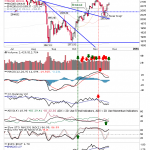Britain’s top share index fell early on Thursday as renewed doubts about the sustainability of a global recovery dented commodity stocks, and banks weakened as risk appetite ebbed.
By 0759 GMT, the FTSE 100 was 33.54 points, or 0.7 percent, lower at 5,145.04 after falling 1.3 percent on Wednesday to its lowest closing level in nearly two weeks.
Miners were the main drag on the index, weighed by a downbeat assessment on the U.S. economy from the U.S. Federal Reserve, with Rio Tinto and Xstrata among the heaviest fallers, down 2.3 percent and 1.6 percent respectively.
In a statement at the end of a two-day meeting, the Fed scaled back its assessment of the pace of recovery, taking note of pockets of weakness, and also issued a cautionary note about volatile financial markets in light of Europe’s debt woes.
“The negative tone on the speed and strength of the recovery from the Federal Reserve is infringing on investors’ expectations and there is a sense that there will be a long period of anaemic growth,” said Henk Potts, analyst at Barclays Wealth.
The shaky demand outlook offset optimism inn the mining sector prompted by political developments after Australia appointed its first woman prime minister, Julia Gillard, who offered to end a dispute over a controversial “super profits” mining tax, which is threatening $20 billion worth of investment and has unnerved voters.
Energy stocks also slipped, pulled lower by a slight retreat in the price of crude. Royal Dutch Shell and BG Group fell 0.8 percent and 1 percent respectively.
Austerity bites
Analysts said austerity measures like those announced by Britain’s finance minister, George Osborne, on Tuesday were also adding to the gloom.
“There’s a huge bill to be paid off for the measures implemented to help solve the financial crisis, and now that bill’s landing on the mat, and investors are looking ahead to five years of fiscal tightening,” Potts at Barclays Wealth said.
Banks were also depressed by doubts on the recovery. Royal Bank of Scotland fell 1.5 percent while Barclays lost 1.7 percent.
Stocks perceived as relatively immune to economic stagnation like supermarkets and utilities outperformed. Morrison Supermarkets added 0.7 percent while National Grid gained 0.3 percent.
No important domestic data were due for release Thursday, so investor attention will be on a batch of U.S. pointers including May durable goods orders and the latest weekly jobless claims, both due at 1230 GMT.
(Editing by Dan Lalor)













Leave A Comment